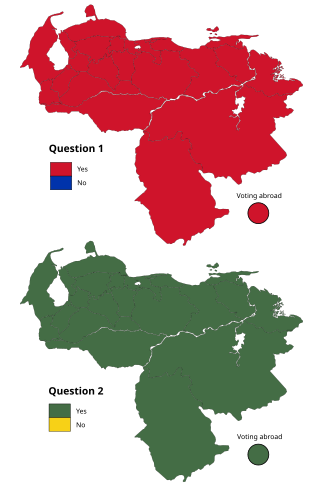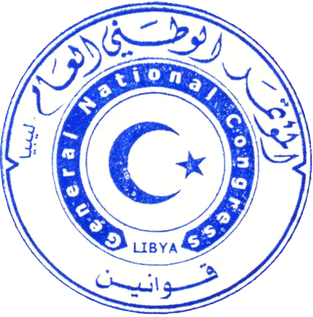
The politics of Libya has been in an uncertain state since the collapse of the Libyan Arab Jamahiriya in 2011 and a recent civil war and various jihadists and tribal elements controlling parts of the country. On 10 March 2021, the interim Government of National Unity (GNU), unifying the Second Al-Thani Cabinet and the Government of National Accord was formed, only to face new opposition in Government of National Stability, until Libyan Political Dialogue Forum assured the ongoing ceasefire.

A constituent assembly is a body assembled for the purpose of drafting or revising a constitution. Members of a constituent assembly may be elected by popular vote, drawn by sortition, appointed, or some combination of these methods. Assemblies are typically considered distinct from a regular legislature, although members of the legislature may compose a significant number or all of its members. As the fundamental document constituting a state, a constitution cannot normally be modified or amended by the state's normal legislative procedures in some jurisdictions; instead a constitutional convention or a constituent assembly, the rules for which are normally laid down in the constitution, must be set up. A constituent assembly is usually set up for its specific purpose, which it carries out in a relatively short time, after which the assembly is dissolved. A constituent assembly is a form of representative democracy.

Elections in Venezuela are held at a national level for the President of Venezuela as head of state and head of government, and for a unicameral legislature. The President of Venezuela is elected for a six-year term by direct election plurality voting, and is eligible for re-election. The National Assembly (Asamblea Nacional) has 277 members (diputados), elected for five-year terms using a mixed-member majoritarian representation system. Elections also take place at state level and local level.

The Constitution of the Bolivarian Republic of Venezuela is the current and twenty-sixth constitution of Venezuela. It was drafted in mid-1999 by a constituent assembly that had been created by popular referendum. Adopted in December 1999, it replaced the 1961 Constitution, the longest-serving in Venezuelan history. It was primarily promoted by then President of Venezuela Hugo Chávez and thereafter received strong backing from diverse sectors, including figures involved in promulgating the 1961 constitution such as Luis Miquilena and Carlos Andrés Pérez. Chávez and his followers (chavistas) refer to the 1999 document as the "Constitución Bolivariana" because they assert that it is ideologically descended from the thinking and political philosophy of Simón Bolívar and Bolivarianism. Since the creation of the Constituent National Assembly in August 2017, the Bolivarian government has declared the 1999 constitution suspended until a new constitution is created.

On 7 July 2012, the National Transitional Council, in power since the Libyan Civil War, supervised democratic elections for a 200-member General National Congress to replace the Council. The assembly was to choose a prime minister and organize parliamentary elections in 2013. A process to write a constitution was also to be determined. Unrest driven by armed militias, ethnic minority and radical groups undermined the process and the government for the years following the overthrowing of Muammar Gaddafi. While internal apathy towards democratic reforms slowed the process, external bodies such as the European Union were still pressing for the establishment of a national dialogue to build consensus for the drafting of a new constitution to take place before the end of 2014. Parliamentary elections were scheduled to be held on 25 June 2014 in a move aimed at stabilizing the country and quelling the unrest.

The present Constitution of Portugal was adopted in 1976 after the Carnation Revolution. It was preceded by a number of constitutions including the first one created in 1822, 1826, 1838, 1911, and 1933.

The House of Representatives is the lower house of the Parliament of Yemen. It shares the legislative power with the Shura Council, the upper house. The Assembly of Representatives has 301 members, elected for a six-year term in single-seat constituencies. It is one of the rare parliamentary chambers in the world to currently have no female representation.

A constitutional referendum was held in Bolivia on 25 January 2009, postponed from the initially planned dates of 4 May 2008 and then 7 December 2008. Drafted by the Constituent Assembly in 2007, the new constitution was approved in the referendum according to an exit poll by Ipsos Apoyo for La Razón and ATB, a Bolivian television network. Furthermore, it required early elections to be held on 6 December 2009.

The Constituent National Assembly or ANC was a constitutional convention held in Venezuela in 1999 to draft a new Constitution of Venezuela, but the assembly also gave itself the role of a supreme power above all the existing institutions in the republic. The Assembly was endorsed by a referendum in April 1999 which enabled Constituent Assembly elections in July 1999. Three seats were reserved for indigenous delegates in the 131-member constitutional assembly, and two additional indigenous delegates won unreserved seats in the assembly elections.

Parliamentary elections were held in Libya on 25 June 2014 for the House of Representatives. Whilst all candidates ran as independents, the elections saw nationalist and liberal factions win the majority of seats, with Islamist groups being reduced to only around 30 seats. Election turnout was very low at 18%.

The Constitutional Declaration is the current supreme law of Libya, introduced due to the overthrow of the Gaddafi government in the Libyan Civil War. It was finalised on 3 August 2011 by the National Transitional Council, and is intended to remain in effect until a permanent constitution is written and ratified in a referendum. The document was publicly announced at a press conference of 10 August by Abdul Hafiz Ghoga, Vice President and official spokesman of the NTC.

A referendum on convening a Constituent Assembly was held in Venezuela on 25 April 1999. It was promoted by President Hugo Chávez, with voters asked two questions on convening a National Constituent Assembly and how that body should be elected. Both proposals were approved by over 80% of voters.

Elections for a General National Congress (GNC) were held in Libya on 7 July 2012, having been postponed from 19 June. They were the first elections since the overthrow and death of longtime ruler Muammar Gaddafi a year earlier, the first free national elections since 1952, and only the second free national elections since Libya gained independence in 1951.

The General National Congress or General National Council was the legislative authority of Libya for two years following the end of the First Libyan Civil War. It was elected by popular vote on 7 July 2012, and took power from the National Transitional Council on 8 August.

Constitutional Assembly elections took place in Libya on 20 February 2014. Nominations for elections to the constituent assembly started on 6 October 2013; registration for candidates to the assembly was over as of 11 November 2013. The assembly will be composed of 20 members each from Libya's three regions: Tripolitania, Cyrenaica and Fezzan. The work of the committee is expected to last from March 2014 until July 2014. The constitutional declaration submitted in August 2011 by the formerly ruling National Transitional Council indicated that Congress itself would appoint the commission; however the General National Congress (GNC) voted instead to hold an election for the selection of individuals to the constitutional commission. The constitutional commission will draw up the constitution, which will then be up for vote in a referendum. As of early January 2014, 1,001,910 voters had registered via SMS.
An Icelandic Constitutional Council (Stjórnlagaráð) for the purpose of reviewing the Constitution of the Republic was appointed by a resolution of Althingi, the Icelandic parliament, on 24 March 2011. Elections were held to create a Constitutional Assembly (Stjórnlagaþing) body, but given some electoral flaws, had been ruled null and void by the Supreme Court of Iceland on 25 January 2011, leading the parliament to place most of the winning candidates into a Constitutional Council with similar mission. The question of whether the text of the proposed constitution should form a base for a future constitution was put to a non-binding referendum, where it won the approval of 67% of voters. However, the government's term finished before the reform bill could be passed, and following governments have not acted upon it.

The Constitution of Costa Rica is the supreme law of Costa Rica. At the end of the 1948 Costa Rican Civil War, José Figueres Ferrer oversaw the Costa Rican Constitutional Assembly, which drafted the document. It was approved on 1949 November 7. Several older constitutions had been in effect starting from 1812, with the most recent former constitution ratified in 1871. The Costa Rican Constitution is remarkable in that in its Article 12 abolished the Costa Rican military, making it the second nation after Japan to do so by law. Another unusual clause is an amendment asserting the right to live in a healthy natural environment.

The 2017 draft Libyan constitution is a draft of a constitution for Libya prepared by the Constitution Drafting Assembly of 60 people elected from around Libya in the 2014 Libyan Constitutional Assembly election.

The High National Election Commission is a body created in Libya for organising elections following the 2011 Libyan Civil War, starting in 2012.

A constitutional referendum was planned to be held in Haiti in 2023. It is the first referendum in the country since 1987, and was unilaterally proposed by the administration of Jovenel Moïse. Originally set to be held on 27 June 2021, the referendum was postponed to 26 September 2021, on the same day as the presidential and parliamentary elections. The referendum was again postponed to 7 November. Acting Prime Minister Ariel Henry later postponed it first to February 2022 and then 2023.












